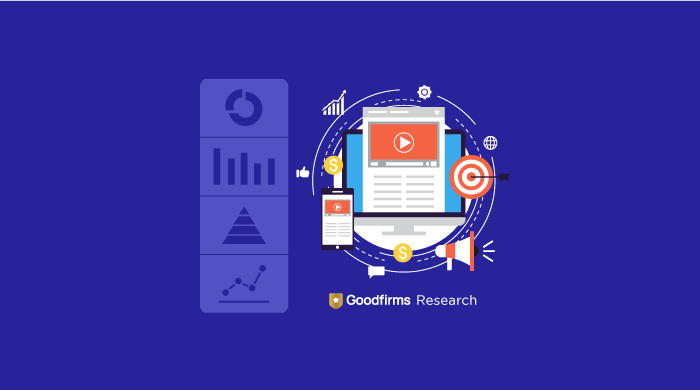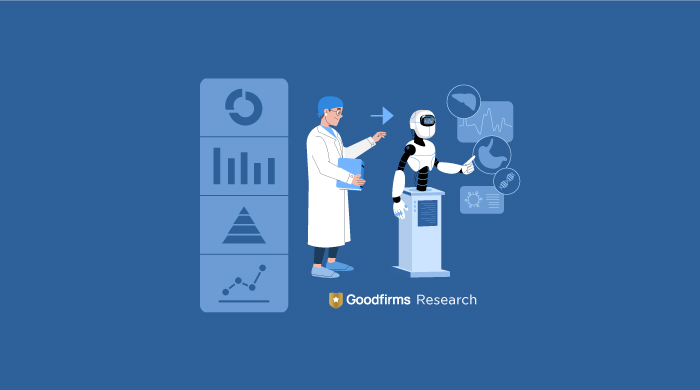ABSTRACT:
As air travel restrictions have been lifted around the world, there is a recovery in domestic and international travel. Air cargo volumes also present an optimistic picture by posting revenues far above the pre-pandemic level in 2021. Leisure travel has rebounded way beyond expectations due to pent-up demand. Business travel is also improving gradually. However, there are risks, such as business travel not reaching the required momentum due to the continuity of pandemic-adopted habits such as video-conferencing. Soaring fuel prices, debt, and interest expenses also remain the three most challenging issues the aviation industry is dealing with in the aftermath of the peak pandemic.
In such a scenario, service differentiation can offer some respite to the airlines and help them increase passenger traffic. Airlines must re-imagine core processes and activities to remain afloat and provide a differentiated passenger experience. Adopting lean strategies to reduce operational costs can be a game changer for the Airline industry. Investing in technologies like artificial intelligence and secured data management solutions will help the industry see a continued shift.
This research, ‘Global Airlines Industry - Trends and Opportunities’ by Goodfirms, is an attempt to provide valuable insights regarding the current global airline trends and the opportunities in the future. The research aims to help the Global Airlines Industry players rebalance their current strategies, meet consumer demands, and scale their businesses. Goodfirms conducted an online survey between 1st July 2022 and 20th July 2022. The survey queried selected participants (Global Airline Industry Experts, Airlines, and Aviation Experts) worldwide on various aspects of the industry.
Table of Contents:
Introduction
Survey Analysis
Top Trends in Global Aviation Industry
- Growing Adoption of Biometrics for Passenger’s Seamless Journey
- Airlines Plan NFT and Metaverse Experiences for their Flyers
- Use of Artificial Intelligence(AI) in Airlines
- Airlines Using Blockchain Technology to Boost Operational Efficiency
- Integration of AR/VR into Standard Processes by the Aviation Industry
- Role of Automation in the Airline Industry
- Internet of Things (IoT) Initiatives to Re-define the Passenger Experience
- A Step Towards Green Airports
- Location-Based Services is Enhancing Passenger Experience
- Tech To Ensure Social Distancing in Airports
Opportunities for the Aviation Industry
- Adopting Latest Technologies
- Focusing on the Right Marketing Strategies to Enhance the Traveling Experience
- Capturing the Global Market
- Maximize Capital Base through Stakeholders Investment
- Minimizing Flight Delays and Cancellations
- Airlines can Bridge the Cultural and Traveling Gap
The Future of the Global Airline Industry Looks Bright with Technological Advancements
Key Findings
Conclusion
Introduction
The COVID-19, followed by frequent lockdowns, travel bans, social distancing, and other restrictions, impacted the airline travel industry’s growth momentum. However, due to quick technological adoption and new innovations, the resilient industry has been breaking new records in 2022. The passenger and cargo volumes are encouraging. Technological breakthroughs have made flying progressively safer, quicker, and more environmentally friendly. Ongoing developments such as artificial intelligence, blockchain, AR/VR, IoT, robotic process automation, social distancing technology, etc., have enabled the aviation sector to continue to thrive despite airlines' challenges. The aviation sector is also attempting to become carbon neutral in upcoming years.
The research ‘Global Airlines Industry - Trends and Opportunities’ by Goodfirms entails all the top trends and opportunities ruling the aviation industry in 2022. This research covers all the technological trends in the global airline sector. The research also identifies and highlights the current opportunities in the aviation industry.
Survey Analysis
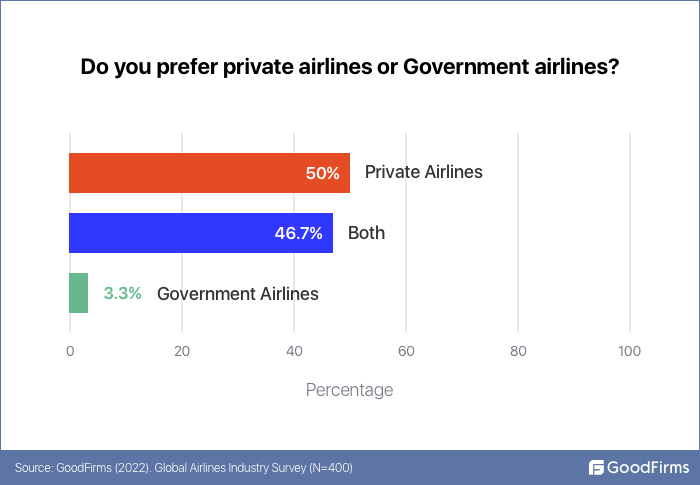
Comments:
50% of surveyees choose private airlines over government airlines; why?
- Factors like competitive cost, technological advantages, and service differentiation have led to the growth of the private aviation market over time. It is now more accessible to the ordinary individual and a more preferred option in comparison to public airlines.
- Private flights provide an alternative for people who desire greater privacy and luxury than what is offered by the majority of government airlines. Private aviation provides more convenience, comfort, privacy, and flexibility.
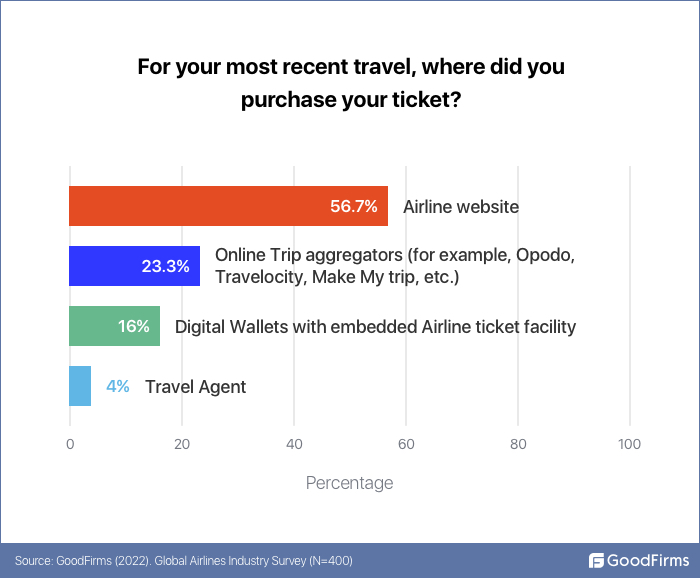
Comments:
- 56.7% of respondents book their flights through airline websites due to various benefits, the most important of which is ease. The main reason the surveyees prefer to book via airline websites is that they provide all the information required.
- 23.3% of surveyees prefer booking tickets via online trip aggregators. Apart from booking the flight, flyers can also book hotels, sightseeing packages, car rentals, etc., from a trip aggregator. Trip aggregators have collaborations with multiple airlines, hotels, car rentals, etc., and provide various choices to customers.
- 16% of flyers book airline tickets via Digital wallets. Digital wallets have embedded airline ticket facilities. Customers also get wallet cashback and coupons for their ticket purchases.
- The travel agents relieve customers of all the booking procedures and duties, saving customers a tonne of time. 4% of surveyees reported booking with the help of a travel agent.
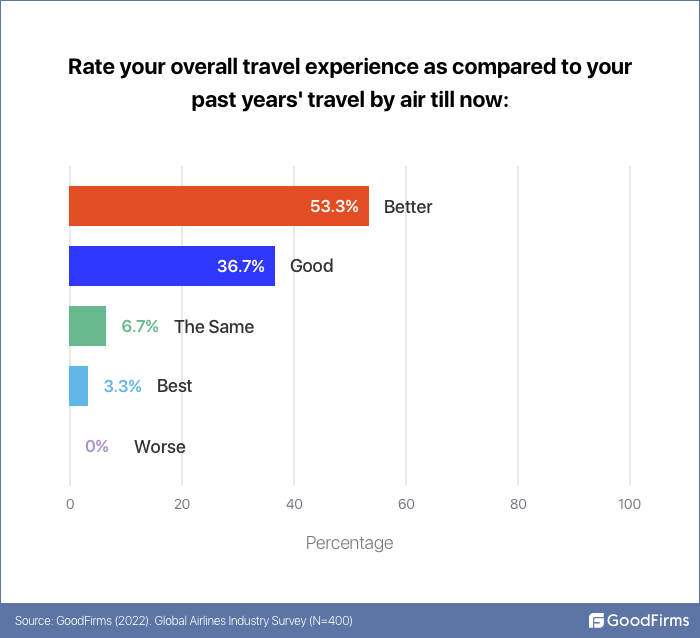
Comments:
- 53.3% say air travel experience is better than in the past years.
- Nowadays, air travel is more affordable, secure, and quicker than ever. After the pandemic, airlines have taken various measures such as temperature screenings, social distancing, hygienic procedures, use of masks, hand sanitization and air filtration systems, and inflight transmission to improve the travel experience of flyers.
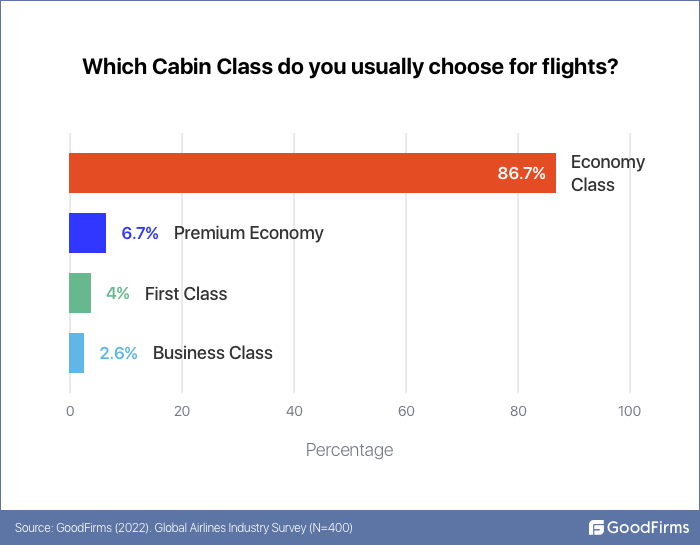
Comments:
86.7% of surveyees choose economy-class cabins for flights. Economy class flights are comparatively low and make flying more affordable for many.
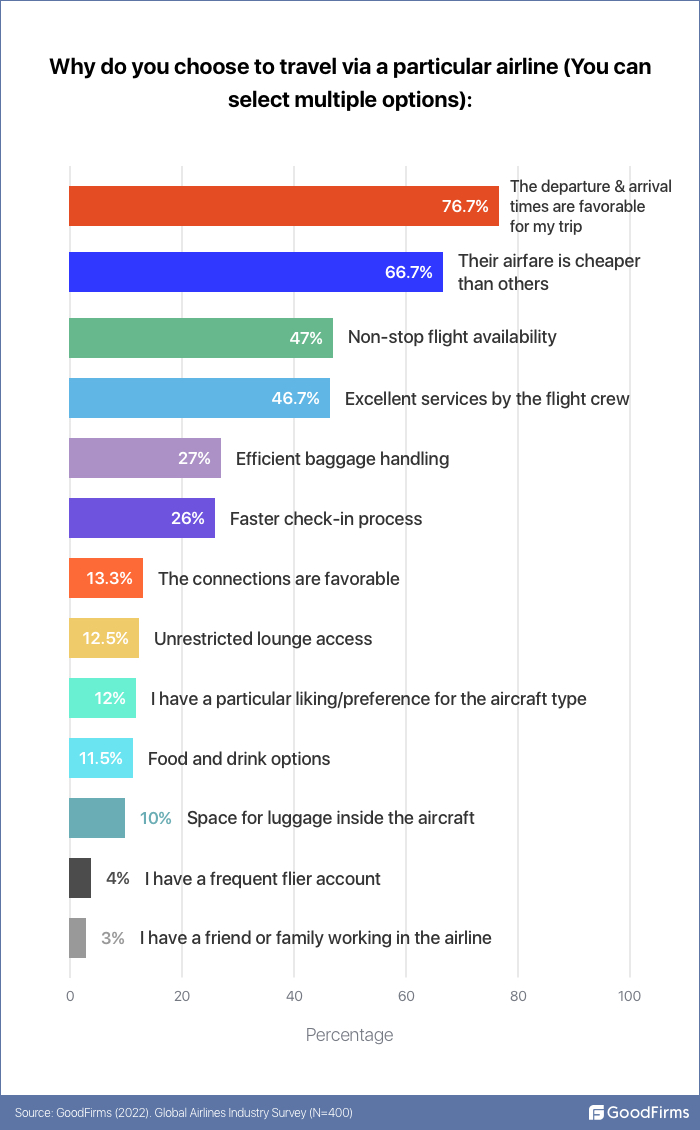
Comments:
- 76.7% choose a specific airline because the arrival and departure times are favorable for their trip. Some airlines give a minimum block time when creating timetables, while others may be more lenient. For this reason, some airlines state a flight from point A to point B will take four hours, while other airlines may indicate four and a half hours.
- 66.7% of surveyees also choose airlines that have cheap airfare. Low-cost carriers (LCCs) have an advantage over full-service carriers (FSCs) in many countries due to their lower costs.
- 47% choose the airline that has non-stop flight availability. Non-stop flights reach destinations faster than flights that make stops at other airports.
- 46.7% of respondents choose an airline because of the excellent services provided by the flight crew. Whether people are flying in first class or economy, the cabin staff is one of the most important aspects of the trip. By providing good incentives and fostering a sense of importance among the crew, the objective should be to increase the loyalty of the passengers and the cabin crew.
- Other factors influencing airline selection choice include efficient baggage handling, faster check-in processes, favorable connections, unrestricted lounge access, etc.
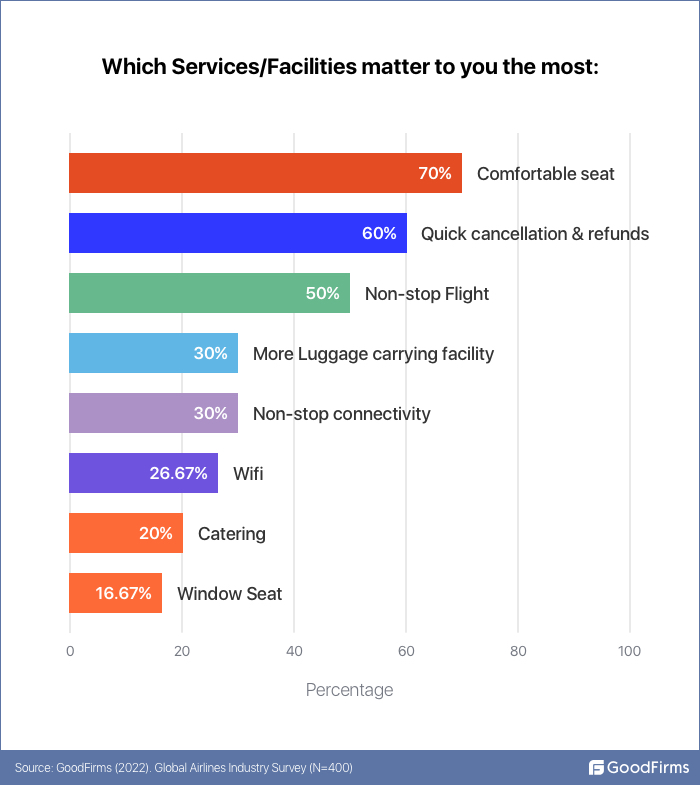
Comments:
- 70% of respondents say comfortable seats are an essential service that affects them the most.
- 16.7% of surveyees prefer window seats, and a few prefer aisle seats because they provide easy access to the restrooms, extra legroom, and the facility of the first exit off the plane.
- 60% reported easy refund and cancellation facilities as an important facility. People prefer those airlines that offer short procedural and easy refund or cancellation facilities to their customers.
- 50% state non-stop flights as a facility that matters most to them. Southwest is one of the most well-known airlines in the United States, offering a quick refund on cancellations and non-stop flight availability. Most of Southwest's tickets are refundable and charge no fees for the flight change.(1)
- Other service aspects desired by flyers include the facility to carry more luggage, non-stop connectivity, wifi, and catering.
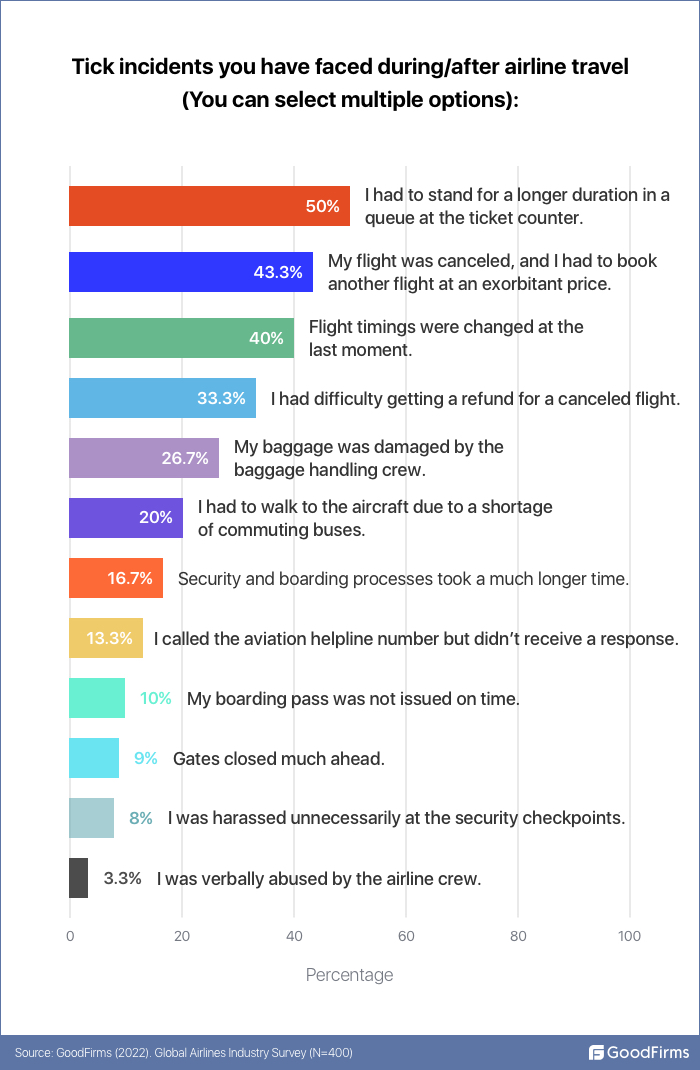
Comments:
- 50% of the surveyees had to stand in a queue at the ticket counter for a longer duration. But now, airline companies are adopting biometrics technology, including fingerprint, retinal, and facial recognition scans, enabling travelers to bypass lineups.
- 43.3% reported flight cancellation as a troublesome incident faced by them. At the same time, 33.3% had to struggle to get a refund on the canceled flights. The aviation sector is experiencing severe disruption due to a sudden spike in travel demand and a lack of staff positions such as airline crew, ground handlers, airport security personnel, and air traffic controllers. Flight cancellations are more frequent than ever. Many travelers wait in lengthy lines at airports for several hours or book another flight at higher charges.
- 16.7% have spent more time in the security and boarding processes. The huge line for security and the boarding process creates a sense of fear in people of losing their flight.
- 20% had to walk to the aircraft due to a shortage of commuting buses. At times people have to cover the distance to reach the aircraft by walking, which is difficult for older adults and those who are late for their flights; in such cases shortage of commuting buses is a mess to face.
- 26.7% of surveyees have also faced mishandling baggage by crew members, due to which they suffered property damage.
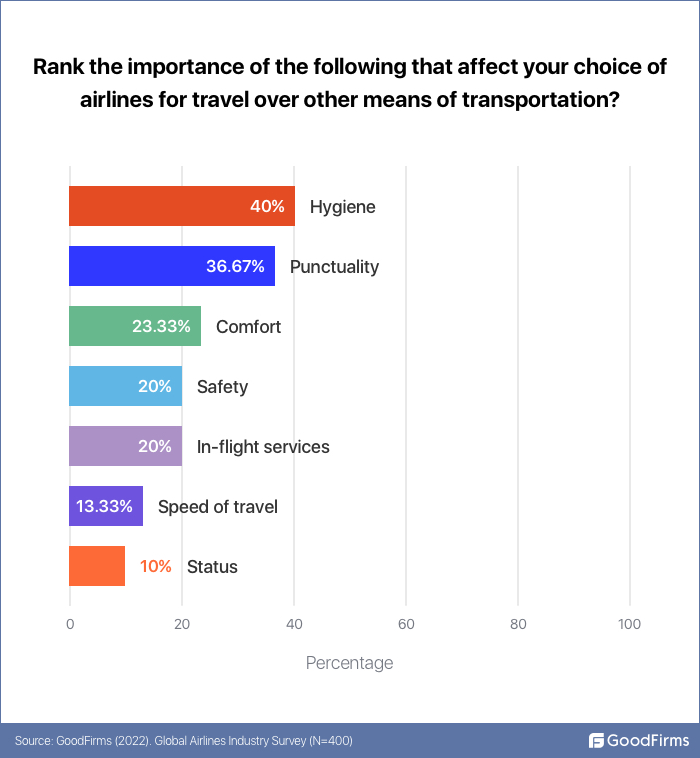
Comments:
- Before the pandemic, the most common criterion used by tourists to select an airline over other means of transport was speed. Contrarily, cleanliness was barely accounted for. However, 40% of surveyees queried by Goodfirms recently ranked hygiene as the most essential consideration in choosing airline travel after COVID-19.
- 36.67% of respondents find punctuality as an important reason for choosing airlines over other means of travel. Customers' value proposition depends heavily on schedules; delays and cancellations negatively influence their travel experience. In most cases, and particularly for business trips, every minute counts toward getting to the destination.
- On the other hand, 23.33% of surveyees placed comfort as the reason prompting them to travel by airline.
- Airlines focus more on improving the business class experience to draw more revenue.
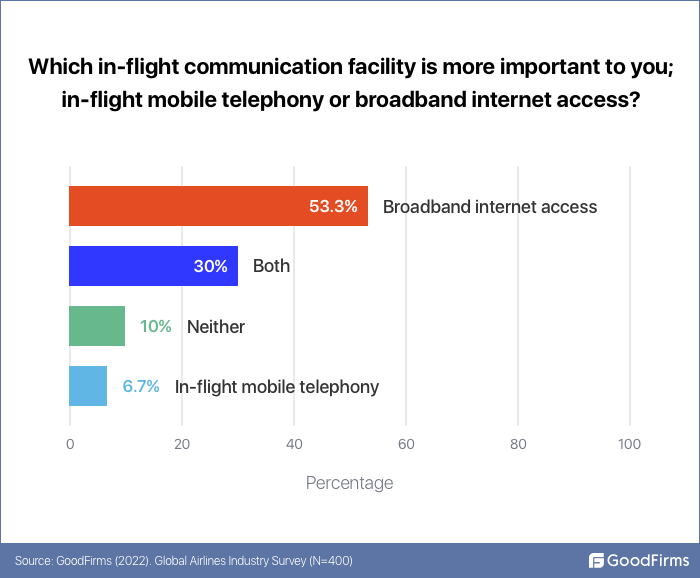
Comments:
-
53.3% of respondents say that broadband internet service is important for them in flight. Fortunately, more and more airlines are now offering in-flight Wi-Fi, allowing passengers to check their emails and surf the web while in the sky. Airlines have reported higher levels of customer satisfaction when they can fulfill their internet commitments.
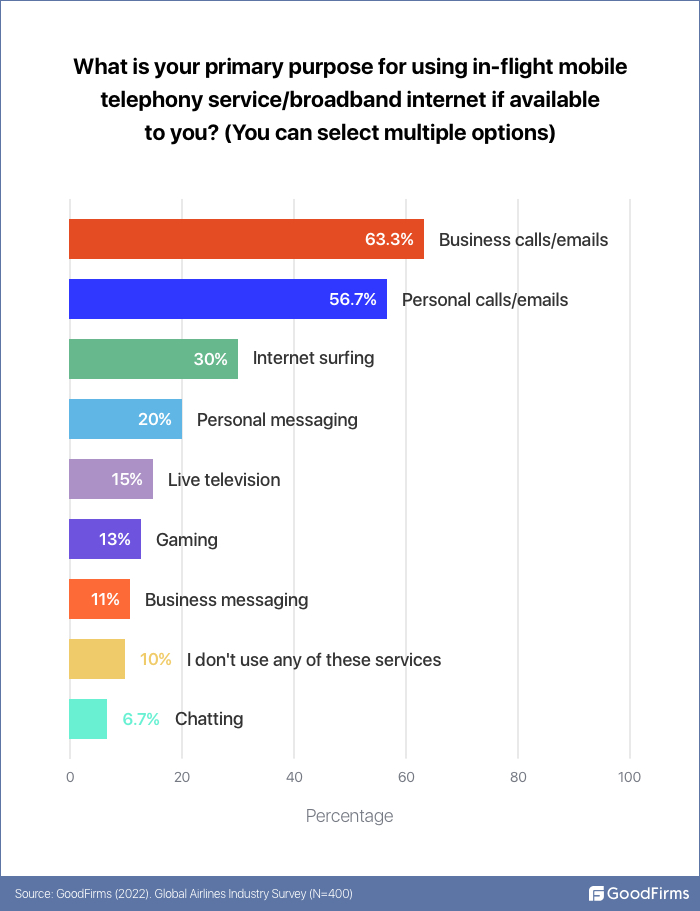
Comments:
63.3% of surveyees need an internet connection to send emails or call for business purposes. In contrast, 56.7% need a WiFi connection for attending to personal calls or emails.
The significant benefits of broadband connection/telephony services in planes are:
- The flyers do not have to wait until they land to send an important email.
- It is beneficial for regular flyers who spend more time in the air than on the ground.
- 30% of respondents want an internet connection for entertainment purposes. The variety of in-flight entertainment options (audio and video entertainment, in-flight gaming, surfing the net, chatting, etc.) available now makes the longer-distance fly enjoyable.
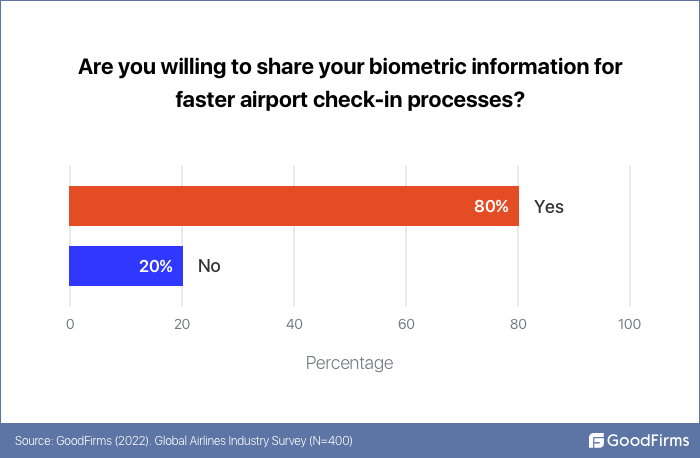
Comments:
80% of the surveyees are willing to share their biometric information for faster check-in processes.
- The first "biometric terminal" with facial recognition check-in stations that resemble boarding pass printers/scanners was officially launched by Delta Airlines in Atlanta.(2)
- The check-in procedure can be sped up by about 30 minutes with this option, which is presently accessible in more than 60 airports across the United States.(3) After signing up for one of the company's plans, users can use it to access airports, stadiums, and other locations.
- Regular airport travelers can anticipate a smoother, quicker check-in experience and an end to the continual worry about losing a passport as fast scanning replaces onerous documentation.
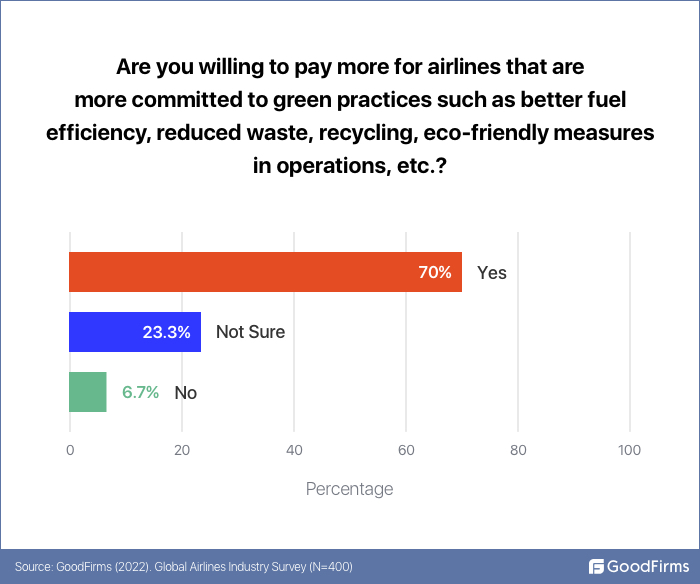
Comments:
70% of surveyees are willing to pay more for their travel by airlines if they follow environmentally friendly practices. Virgin Atlantic, Air France / KLM, Alaska Airlines, United Airlines, JetBlue, and Delta are the top eco-friendly airlines.(4) For customer satisfaction and environmental protection, most airlines are transitioning from conventional jet fuels manufactured from fossil fuels to those made from renewable sources and with reduced production emissions. Airlines are also looking to novel materials and coating technologies to make planes lighter, more aerodynamic, and more durable against wear and tear.
Top Trends in Global Aviation Industry
Growing Adoption of Biometrics for Passenger’s Seamless Journey
The primary source of frustration for passengers continues to be the lengthy lines at the security checkpoint or the baggage carousel. They are made even more frustrated by the continuous requests for them to produce their passports, identity cards, or boarding permits for inspection. Airlines are experimenting with biometrics identification methods to address these problems and make the travel experience as frictionless as possible for passengers.
The industry is still in the early stages of adopting biometrics. However, a few airlines have already started investing in facial and fingerprint identification technology. The technology is being tested in boarding, security, lounge access, and check-in areas. Hamburg airport deployed contactless facial recognition for seamless security passage and boarding in April 2022.(5) Miami international airport has confirmed implementing biometrics boarding at all 130 gates by 2023.(6)
Airlines will eventually replace paper and mobile boarding cards with facial, iris, or fingerprint scans with passenger identification systems.
80% of surveyees are willing to share their biometrics information for faster airport check-in processes. 20% have privacy issues and are not comfortable sharing their biometrics. Airlines could benefit from biometrics by reducing passenger wait times if data's associated privacy issues are solved.
Airlines Plan NFT and Metaverse Experiences for their Flyers
Emirates is all set to introduce NFTs and thrilling experiences in the metaverse for its consumers and staff.(7) The airline is known for its supreme quality goods and customer-focused services. It plans to create iconic brand experiences in the metaverse with valuable and useful NFTs.
"The longevity of blockchain technology has been established. We were the first airline to take Bitcoin as payment, so offering non-fungible tokens is our next logical step in blockchain technology. NFTs aren't just used for buying and selling digital art; they might also be used for buying and selling concert tickets and other special one-time items like airline tickets. The release of the limited collection NFTs will act as a marketing tool for Latvian cities, which are undoubtedly still underrated tourist destinations." said Martin Gauss, CEO of airBaltic.(8)
Frequent Flyers and other airline loyalty programs give customers a one-of-a-kind experience. The Metaverse can be used to supplement this by providing access to special offers, discounts, and VR/AR use cases. The metaverse will revolutionize transportation, and in addition to business travelers, many leisure travelers will become the main target market for ALPs.(9) NFTs would be more helpful in the upcoming years as the predominant demographic of air travel switches to GenZ.
Use of Artificial Intelligence(AI) in Airlines
By 2025, it is anticipated that the market for artificial intelligence (AI) in the aviation industry will reach USD 2,222.5 Million.(10)
Different application cases for the industry's adoption of AI are starting to take shape:
- Virtual assistants facilitate airlines in increasing both productivity and pilot effectiveness.
- Chatbots are becoming more adept at answering passenger questions.
- An artificial intelligence-based, robotic aided convenience system that immediately troubleshoots and diverts high-risk baggage for deeper examination improves the efficiency of screening passenger checked luggage.
- AI thermal cameras with facial recognition technology are utilized to identify feverish passengers.
AI is playing a key role in airline disruption management.(11)
“Artificial intelligence is making a huge difference in conversational recruiting using chatbots", say, Sarah Steinmann and Shannon O’Bryant, Talent Acquisition Specialists, Southwest Airlines at the IAMHR virtual conference event 2021.(12)
Today, AI improves employee efficiency, automation and self-service solutions, and greater levels of aviation safety through predictive and prescriptive aircraft maintenance. The clever use of AI also enables airlines to make smart decisions about pricing and market positioning.
Airlines Using Blockchain Technology to Boost Operational Efficiency
Blockchain has the actual ability to segregate and separate data. Because of the significant risk involved with data quality and the growing need for correct data as part of airline operations and security systems, aviation is primarily dependent on good record keeping.
The goal is to safeguard the passengers' sensitive personal information and right to privacy.
Due to its decentralized nature, where each party will have access to the exact copy of the ledger database and be able to spot any inconsistencies, blockchain enables a secure version of that data that can be shared more effectively. This version is not accessible to third parties and is immune to attacks.
Blockchain is essential for an end-to-end passenger experience that is secure, frictionless, and efficient, as it enables travelers to pass through airports without ever taking their passports out of their pockets. The goal is to give travelers a frictionless airport experience that allows them to move from the entrance to the gate without any stoppages.
The top international airlines have been researching various applications of Blockchain technology to boost operational efficiency:
- Emirates is testing a health passport powered by a blockchain called ICC AOKpass. Passengers can use this app to show their smartphones' COVID-19 bad results.(13)
- To enhance its customers' flight experiences, Delta Airlines is a member of the blockchain research institution.(14)
- Lufthansa founded the Blockchain for Aviation (BC4A) program, which aims to involve a wide range of stakeholders, including aircraft manufacturers, logistics companies, MRO service providers, and software creators.(15)
- Singapore Airlines uses blockchain technology as part of its frequent flyer loyalty program using KrisPay, which provides consumers with rewards.(16)
Integration of AR/VR into Standard Processes by the Aviation Industry
When it comes to the aviation sector, no consumer complaint is too trivial. They are renowned for offering excellent experiences, and by implementing cutting-edge technology like AR and VR, they are increasing client happiness. The airline sector is improving flight safety, saving costs, and giving passengers a smooth travel experience by incorporating AR into routine processes.
Long-haul flights will have immersive 360-degree VR experiences, giving passengers more entertainment choices besides watching movies and using the aircraft's Wi-Fi. Even reducing flight phobia for some people may be possible with virtual reality.
The Hydrous offers access to Google Earth VR, Oculus, and Immerse for exploring virtual travel experiences. Virtual reality travel "trips" to places like Hawaii, Rome, and Paris are available through companies like First Airlines.(17) Their VR experiences start with four-course meals on first-class flights, then VR tours of the area's top attractions.
Role of Automation in the Airline Industry
The automation of the aviation sector has advanced significantly, and it will continue to grow in the following years. The aviation industry can gain from robotic process automation (RPA) since it is the most globally diversified of all sectors. RPA is an essential tool for reducing costs and raising efficiency standards. RPA is renowned for its high operational accuracy and dependability, enabling enterprises to adapt quickly and successfully. Integrating RPA software bots into the flying experience can allay user apprehensions.
RPA solutions can be put into place extremely fast, which has increased their value for airlines seeking to manage the challenges brought on by the pandemic that is straining their reservation centers.(18)
Efficiency is critical in aviation, from low-cost carriers to full-service airlines. Automation improves airplane security and reduces the amount of physical work required, resulting in lower airfare. Decreased operational costs translate into lower ticket prices, and airlines can see an increase in consumers and revenue.
Internet of Things (IoT) Initiatives to Re-define the Passenger Experience
Airlines are still working to modernize their outdated systems, but many have launched Internet of Things (IoT) projects to redefine the traveler experience. IoT is being considered by airlines for operational applications ranging from luggage handling to in-flight entertainment. EasyJet has outfitted its ground workers and cabin crew with wearable technology uniforms, claiming to be the first airline to do so.(19)
In 2013, David Bulman, then-Virgin Atlantic's IT director, stated that "the Internet of Things, in a broad sense, is where we are starting to see everything from planes to cargo systems getting connected."(20)
By connecting their native mobile apps with airport beacons, airlines can also provide customized navigation at airports. Passengers' whereabouts as they move between terminals can be utilized to lead them to departure gates, send them personalized offers, or point them in the direction of discounted lounges.
IoT analytics can provide airlines with many upsell and cross-sell options. Upgrade offers and other customized in-flight services can be created using information about passenger preferences. Additionally, all fees for curated entertainment content with seamless digital payment account debits may be available.
A Step Towards Green Airports
There is growing pressure on the aviation industry to do more to combat climate change, but gas-guzzling aircraft aren't the only culprits. As airports grow, so does their carbon footprint because more energy is needed to run additional terminals, ground transportation vehicles, and infrastructure development.
A reaction among environmentalists may result from expanding space for more aircraft. As a result, several airports all around the world(Boston Logan International Airport, US, Galápagos Ecological Airport, Galápagos Islands, Stockholm Arlanda Airport, Sweden, Delhi Indira Gandhi Airport, India, etc.) have incorporated greener features into their designs and operating principles as well as enrolled in eco-friendly programs.(21) These airports are setting an example for other aviation hubs to follow through with sustainable practices and the utilization of renewable fuel sources.
Location-Based Services is Enhancing Passenger Experience
LBS can now give airport management the best solutions to handle security and operational issues while enhancing the passenger experience from door to door.
LBS helps reduce stress levels among travelers by giving details on check-in and security line wait times. Wi-Fi and iBeacons are being used at Finland's Helsinki Airport to track travelers and provide location-based services.(22) LBS is used by airport authorities to streamline work processes and maintain safe ground operations. LBS enables airport administrations to quickly dispatch workers and security officers to respond to events wherever they may occur. Airport operators utilize proximity marketing to communicate duty-free offers, food and drink discounts, and other in-store promotional advertisements to travelers, making airport navigation easier.
Tech To Ensure Social Distancing in Airports
Although vaccination programs are making progress against the virus's threat, social isolation will continue for the foreseeable future. One of the most prominent users of social distancing technology has been airports.
“Our objective is to instill trust in our customers and provide them with the tools they need to travel safely, knowing that today's travel requirements are dynamic,” said Emirates’ COO Adel al Redha.(23)
Camera-enabled crowd-density sensors already regulate passenger flow through active regions. In other cases, people flow management and improved physical separation have been achieved using 3D and radar sensors. Virtual queuing, security checkpoint reservations and bingo boarding are other social distancing technologies implemented in airports across America.(24) These technologies reduce crowding at the traditional passenger route bottlenecks.
Opportunities for the Aviation Industry
Opportunities are significant elements that can support the development and expansion of the brand.
Adopting Latest Technologies
Airlines will accomplish for the world what railways have done for nations. "First Europe, then the entire world, will be connected by aviation, and the nations will become so entwined that they will become neighbors in a very real sense." 1914: Claude Grahame-White (Aviation pioneer)(25)
An effective marketing plan and a commitment to technological innovation can significantly improve airline operations. There are new technologies for fuel cost savings, maintenance savings, and solutions to boost productivity and profitability. This can include in-flight connection and virtual reality (VR), which can amuse passengers as they wait in line at the airport or while sitting in the aircraft. Biometric identification methods are also gaining popularity, and traveling will be safer and more convenient with biometric verification or facial scanning.
Focusing on the Right Marketing Strategies to Enhance the Traveling Experience
Airlines must undertake proper marketing techniques to thrive in the aviation sector. Many people have reported issues regarding flight delays, poor customer service, and hefty surcharges.
26.7% of respondents say the baggage handling crew damaged their baggage. On the other hand, 33.3% had difficulty getting a refund for a canceled flight.
- Airlines must develop distinctive loyalty schemes. Along with the loyalty program, giving passengers a free seat upgrade and providing an aircraft meal can improve an airline company's reputation.
- Ron DeFeo, senior vice president of global engagement for American Airlines, stated that "communities around the country have witnessed a spike in need for meals, and we had a surplus of food owing to the decreased needs for air travel.”(26). Customer loyalty is increased through making a social impact. Creating respect is essential to any marketing campaign because it is evident that people who have read about the job done by Airlines would respect their brand.
- Providing customers with a top-notch travel experience by delivering high-quality equipment, fast internet connection, and the ability for passengers to view TV series and movies while flying, the airline can provide an enjoyable in-flight experience.
- An airline can offer mailing services in aviation to send mail and packages worldwide. Additionally, it may provide unique fare packages for people making leisure or business trips to particular locations.
Capturing the Global Market
With the rise of globalization, airlines can now operate in nations other than their own. Growing the client base can be achieved by entering international markets. This will help attract new travelers and foster enduring ties with current ones. Additionally, by adding more destinations to their flight schedules, airlines can increase their popularity, directly affecting their brand's reputation and image.
Maximize Capital Base through Stakeholders Investment
“Sincerely, we are a state-owned business. Therefore, a bailout is not an option; any financing we get is an investment in the business.” said the Qatar Airways Group CEO, H.E. Akbar Al Baker.(27)
The aviation industry is constantly expanding, and more and more industry participants and stakeholders are eager to invest in the aviation industry. Airlines can use this opportunity to boost their capital base and maximize profits.
Minimizing Flight Delays and Cancellations
Though the aviation sector has shown considerable growth in the past few months, it is still lagging as the rest of the world recovers from the pandemic. Flight cancellations and delays are now common in air travel. U.S. carriers canceled more than 2,500 flights over Memorial Day weekend.(28)
43.3% of surveyees said their flight was canceled, and they had to book another flight at an exorbitant price. While 40% of respondents say their flight timings were changed at the last moment.
There are frequently several factors that contribute to delays. Still, some of them include inclement weather, tardy ground staff in refueling planes, and an airport overwhelmed by the number of passengers waiting for the pilots. One method to cut back on delays is the increased use of advanced monitoring technology to improve airport and airline operations.
Airlines can Bridge the Cultural and Traveling Gap
An essential component of people's mobility is air travel. The ability to fly over great distances quickly and safely makes aviation preferable for all types of travel, whether for business, pleasure, or both. Millions of people can exchange cultures thanks to air travel, which also helps the tourism sector, a key driver of the economies of both the origin and the tourist destinations.
The increase in leisure travel will surpass business travel recovery as the pandemic fades. Business travel will take longer to recover and probably only reach pre-pandemic levels of about 80% by 2024.(29) People will take fewer business travels as remote work, and other flexible working options will likely continue.(30)
The Future of the Global Airline Industry Looks Bright with Technological Advancements
The COVID-19 pandemic has caused problems for the airline sector. New viral outbreaks and travel restrictions prohibited the industry from expanding when the rehabilitation process started in 2021. But despite fresh scars, this year is supposed to be the year of gradual but persistent healing. In the first few months of 2022, global passenger traffic was up to 83.1% of 2021(31), but intercontinental traffic has a long way to go.
Airlines will need to periodically revisit their key operating assumptions to stay relevant as digital technologies continue to alter the sector and reshape consumer expectations. To create an engaging and unique passenger experience, they will need to rethink core processes and activities. Airlines will also need to make "smart" use of technologies as the "consumerization" wave transforms the industry. To solve urgent passenger pain points, they will need to actively experiment with new technologies and continuously apply upgraded strategies to improve their growth.
Key Findings
- 50% of surveyees choose private airlines over government airlines.
- 56.7% of respondents book their flights through airline websites due to various benefits, the most important of which is ease.
- 33.3% of surveyees prefer booking tickets via online travel agents or trip aggregators.
- 53.3% say their air travel experience is better than in past years.
- 86.7% of surveyees choose economy-class cabins for flights.
- 76.7% choose to travel by airline because the arrival and departure times are favorable for their trip.
- 66.7% of surveyees also choose airlines that have cheap airfare.
- 70% of respondents prefer flying because of the comfortable seats offered to them by aircraft.
- 50% of the surveyees had to stand in a queue at the ticket counter for a longer duration.
- 43.3% reported flight cancellation as a standard incident faced by them.
- 33.3% have to struggle to get a refund on the canceled flights.
- 40% of surveyees rank hygiene as the most essential consideration in choosing an airline for travel after COVID-19.
- 36.67% of respondents placed punctuality second before choosing the airlines for their travel.
- 23.33% of surveyees placed comfort as the third choice before booking tickets.
- 53.3% of respondents say that broadband internet service is essential for them in flight.
- 63.3% of surveyees need an internet connection to send emails or call for business purposes. In contrast, 56.7% need a WiFi connection for attending to personal calls or emails.
- 80% of the surveyees are willing to share their biometric information for faster check-in processes.
- 70% of surveyees are willing to pay more for their travel by airlines if they follow environmentally friendly practices.
Conclusion
The airline sector supports worldwide trade, tourism, and economic expansion directly or indirectly. As a result, it is crucial to the onset of globalization occurring in many other businesses. Domestic travel will resemble pre-crisis levels in 2022, and the air cargo industry is currently doing well.
Although the airline business is prospering, the pandemic's beginning has impacted it. People are eager to travel now that borders are open and travel restrictions have been abolished. This will significantly impact the development of the airline sector in the future. With time and technological progress, the airline industry's strengths, weaknesses, opportunities, and risks will continue to change. Cheaper flights will boost demand and enable the business to grow to its full potential. Exceptional customer experience will always be the winner.
We sincerely thank our Research Partners who participated in the survey.
References:
- https://www.southwest.com/html/air/fare-information.html
- https://news.delta.com/delta-unveils-first-biometric-terminal-us-atlanta-next-stop-detroit
- https://www.usatoday.com/story/travel/airline-news/2019/08/16/biometric-airport-screening-facial-recognition-everything-you-need-know/1998749001/
- https://www.greenvacations.com/eco-friendly-airlines/
- https://www.hamburg-airport.de/en/star-alliance-biometrics-at-hamburg-airport-50722
- https://www.futuretravelexperience.com/2022/05/mia-to-introduce-biometric-boarding-at-all-gates-by-2023/
- https://www.emirates.com/media-centre/emirates-to-launch-nfts-and-experiences-in-the-metaverse/
- https://simpleflying.com/airbaltic-nft-sales/
- https://www.fastcompany.com/90694275/how-the-metaverse-will-change-transportation-as-we-know-it
- https://www.prnewswire.com/news-releases/global-22-bn-artificial-intelligence-in-aviation-market-2018-2025-market-to-grow-at-a-cagr-of-4665-300618741.html
- https://arxiv.org/pdf/2104.03349.pdf
- https://youtu.be/EnKDhcQFJLc
- https://www.ledgerinsights.com/emirates-airlines-ge-aviation-blockchain-covid-19-travel-testing-app/
- https://www.blockchainresearchinstitute.org/members/
- https://www.lufthansa-industry-solutions.com/de-en/solutions-products/aviation/generating-more-transparency-in-aviation-with-blockchain-technology/
- https://mainlymiles.com/2020/10/10/singapore-airlines-rolls-out-kris-as-its-new-krispay-lifestyle-app/
- https://www.forbes.com/sites/bernardmarr/2021/04/12/the-amazing-ways-vr-and-ar-are-transforming-the-travel-industry/?sh=7c6db7f436e0
- https://www.protiviti.com/IN-en/insights/next-gen-intelligent-automation-airlines
- https://internetofbusiness.com/10-real-life-examples-iot-aviation/
- https://www.slideshare.net/assemam/application-of-new-technologies-and-it-in-airportsiot-and-ai
- https://www.airport-technology.com/analysis/worlds-environmentally-friendly-airports/
- https://internetofbusiness.com/10-real-life-examples-iot-aviation/
- https://www.ledgerinsights.com/emirates-airlines-ge-aviation-blockchain-covid-19-travel-testing-app/
- https://www.bbc.com/news/business-50214631
- https://robosoft.medium.com/10-emerging-technologies-that-are-reshaping-the-flying-experiences-for-the-airline-industry-4af86995315#:~:text=Wearable%20technology,new%20crew%20members%20and%20engineers.
- https://www.travelandleisure.com/trip-ideas/volunteer-charity/american-airlines-donates-25000-meals-lee-initiative
- https://samchui.com/2021/04/15/exclusive-interview-with-qatar-airways-group-ceo-h-e-akbar-al-baker/#.Yue3jnZBzIV
- https://www.usnews.com/news/top-news/articles/2022-05-30/u-s-airlines-cancel-2-500-flights-over-memorial-holiday-weekend
- https://www.mckinsey.com/industries/travel-logistics-and-infrastructure/our-insights/back-to-the-future-airline-sector-poised-for-change-post-covid-19
- https://www.mckinsey.com/featured-insights/future-of-work/the-future-of-work-after-covid-19
- https://www.iata.org/en/pressroom/2022-releases/2022-07-07-02/







